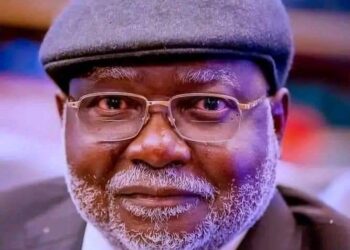Gloria Mabeiam
The best way to celebrate an anniversary is to evaluate the challenges that remain unsolved. June 12 stands out in the annals of Nigerian history as a political memorial and a date of unresolved intrigues. It is no wonder that twenty three years after, the issues are as rife as they were and the questions as numerous as were asked of an election touted to be the most fair.
To continue to look at the rear mirror is not to make progress. However to forget the road that led us to the point we now are is to bend the compass for the future generations. Chief MKO Abiola who was the main character of the June 12, 1993 election brandished his “Hope 93” slogan to a nation that was then yearning for a democratic government and one that was truly in need of hope that a free government would replace military rule.
Invariably, the nation was not in need of a system of government as it was in dire need of a messiah who would fix the myriad of problems that were then plaguing the nation. Today, and twenty three years after, the much desired democracy has come but not the fruits desired from the democratic tree. There have been graftings and species swaps but not the product that the people so earnestly desire. Since the strategy for the entrenchment of a government where people are self-governed by the will of the majority, we have been adopting but not have not yet adopted; what we have so far adopted has not led us to the el-dorado.
The question that arises is this: if after experimenting on different methods of governance, government has failed to entrench the right reform on the Nigerian economy and its people, should we not stop and evaluate our strategies, limits or conditions in order to get things right?
Taking the Niger Delta Avengers as example, it may well be that the time has come for us to think outside the box. What can permanently quell the voice of agitators depends on the justice executed in the matter. If criminals are rewarded to the detriment of the larger Niger-Delta people, then we would have employed a method that does not guarantee results.
Encouraging the citing of private local refineries where the people manufacture refined petroleum products could spur the determination and fervor of the people and their willingness to respond to the call to end pipeline vandalisation. But that is merely just a single suggestion.
The Buhari-led administration just like administrations before and after it have the duty to meet up the country’s call for sustained and special strategies that galvanise support of the policies and endeavours that would put keep the country moving forward. It is time for the specialists in crafting people-responsive policies to step out.
Security is one other issue that makes the Hope 93 still an aspiring theme. Only last week, the Department of State Services reported arrest of five persons involved in the creation of sleeper training cells for ISIS in Kano. The report followed a U.S. official statement that there is no evidence that Boko Haram has received significant operational support or financing from ISIS.
What this means is the confirmation of the allegation of security analysts that our security challenges are not just home spun but internationally baked. One would wish at this point that we would together and in unison stop terrorists in their tracks by employing every means of diplomacy, directing any tool of research deploying relevant security agents to the defeat of terror network.
Our response needs to involve more than just ending Boko Haram. We would need a lengthy campaign that educates people of homeland security until our nation feels safe and immune from further attacks.
Abiola’s June 12 offered more than a united Nigeria. His campaign was largely predicated on a promise of a vibrant economy. Today, many Nigerians have remained hopeful of that country where basic necessaries are not luxuries. That hope is now waning if not being dashed.
The Buhari administration rode on the goodwill of an expectation that Mr. Integrity will cause a dramatic turnaround for good.
One year after, the economy has shrunk and living has become difficult. Fuel now sells at an all-time high of N145.Tomatoes is now the new goldmine. Hospitals are still not able to respond to the challenges of simple diagnosis. Power cuts are more regular. Pipe borne water is hardly available. In fact not much is different from where we are coming from.
One wonders what it is that defies solutions to our problems. But we are reminded at a moment where the world mourns former world heavy weight boxing champion, Muhammad Ali, of his determination, resilience and zeal which he often captured in his chants before his time in the ring. In 1974 before his ‘Rumble in the Jungle’ match with George Foreman, he roared: “ I done wrestled with an alligator, I done tussled with a whale, handcuffed lightning, thrown thunder in jail; only last week I murdered a rock, injured a stone, hospitalized a brick.
I’m so mean I make medicine sick.”
Yes, Ali was that vicious against his challenger.Too often; he came out of the ring proving his words to be true perharps because those words spurred him on and gave him direction. A champion of many rounds, Parkinson disease would later ravage Ali’s body for 32 years. In turn, he bravely gave the disease a run for those three decades until a septic shock silenced him. Nigeria needs to replicate his courage in the fight against the enemies of our territorial integrity. We must not bow to our challenges but keep hitting until these state demons crumble and bow down.
Like Ali, the desire to silence the impossible should raise our innovation antennas up and keep our conspiracy theories down.
For those who argue in favour of ‘government’s selective fight against corruption’; the corresponding duty to even this fight by projecting those shielded lie with us. We must, in the words of Ali, make medicine sick.
Democracy gives citizens a voice; it is up to citizens to take up this voice and amplify against the vices that plague our nation. Again since Nigeria portends to run a federal system, the time is now ripe to ensure that in consonance with true Federalism, the centre be de-concentrated of power for power to devolve to the component units.
The units can then strengthen its laws to keep its territory secured as well as find ways to re-jig its economy.
FAREWELL TO NIGERIA’S GREATS
As the world continues to serenade the life and times of Muhammad Ali, our nation owes it to patriotism to celebrate our own Stephen Keshi and Amodu Shaibu, two former coaches of Nigeria’s Super Eagles. Unfortunately, death came calling for them at short intervals.
The world of football as it is known in Nigeria will change in many ways with the death of these gentlemen who invested the strength of youth and the experience of age to put our country forward in perharps the foremost game that binds our country together. May those who see value in patriotism be inspired by the works that these true Nigerians have left behind. May we all pick up from where they left up; fired by the zeal to better the lot of our country and to do more than duty demands.



